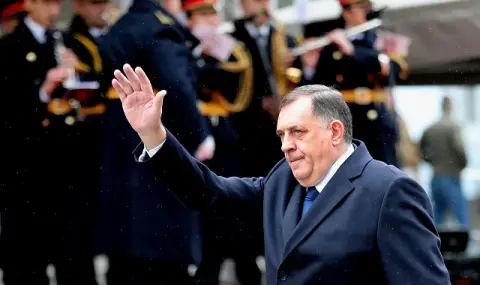President of the Bosnian Republika Srpska Milorad Dodik said today that the constituent part will initiate a procedure for declaring independence as a response to the UN resolution on the genocide in Srebrenica, Bosnian national TV BHRT reported, quoted by BTA .
The resolution on Srebrenica was initiated by Germany and Rwanda and it asks that July 11 be declared the International Day of Remembrance of the Genocide in Srebrenica. The Srebrenica massacre occurred in July 1995, when Bosnian Serb forces led by General Ratko Mladic killed 8,000 Muslim men and boys in the enclave, declared a UN safe zone.
This resolution is expected to be voted on at a meeting of the UN General Assembly in early May.
„I am proud of the determination to implement these measures regarding independence”, Dodik said at a press conference and added that the Bosnian Muslim elite scored a serious “own goal” with the resolution on Srebrenica. “The genocide in Srebrenica did not happen – if it had happened, there would be no need for the constant return to this subject. The courts that have passed judgments have done so for specific individuals, not for the people”.
According to him, 4,100 Muslims died on the territory of Srebrenica from 1992 to 1995, but nowhere is it mentioned that between 2,500 and 3,500 Serbs also died.
„Genocide is a fabrication that will divide us. They want to make Srebrenica synonymous with genocide, but it remains unclear exactly how many (people) have died," Dodik pointed out. “No talks about accepting the so-called resolution on Srebrenica will not survive. Peaceful division is the only solution for all peoples in Bosnia and Herzegovina.
After the 1992-95 inter-ethnic war in Bosnia and Herzegovina, in accordance with the terms of the Dayton Peace Agreement, the country was divided into two semi-autonomous parts - Republika Srpska, inhabited mainly by Bosnian Serbs, and the Muslim-Croat Federation of Bosnia and Herzegovina, where Bosnians live Muslims (Bosniaks) and Bosnian Croats. Dodik constantly calls for the separation of the Serbian component from Bosnia. He faces sanctions from the US and Britain over his policies, but has the support of Russia. He is currently being prosecuted for refusing to comply with the decisions of High Representative Christian Schmidt. Republika Srpska does not recognize Schmidt's authority, arguing that his election was not confirmed by the UN Security Council.
